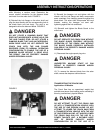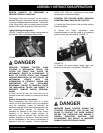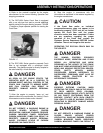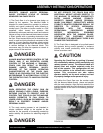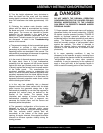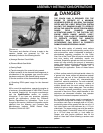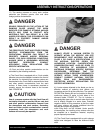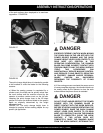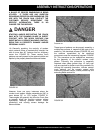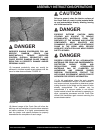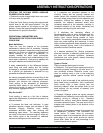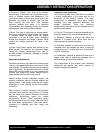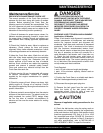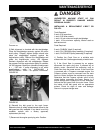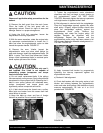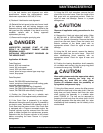
RCC130H-CRACK SAW OPERATION AND PARTS MANUAL REV #1 (11/18/04) PAGE 27
ASSEMBLY INSTRUCTIONS/OPERATIONS
A BLADE OF PROPER DIMENSIONS IS BEING
UTILIZED. IF THERE ARE ANY QUESTION
REGARDING PROPER BLADE DIMENSIONS FOR
USE WITH THE CRACK SAW, CONTACT THE
CUSTOMER SERVICE DEPARTMENT FOR
SPECIFIC INFORMATION. THERE IS NO
CHARGE FOR THIS SERVICE.
DANGER
STARTING AND/OR RESTARTING THE CRACK
SAW WITH THE DIAMOND BLADE IN DIRECT
CONTACT WITH THE WORK SURFACE CAN
SUBSTANTIALLY REDUCE MACHINE CONTROL,
RESULTING IN PROPERTY DAMAGE AND/OR
PERSONAL INJURY.
14) Generally speaking, the majority of random
crack patterns follow a predominantly straight line
with no more than 20˚ variance from an imaginary
center line. FIGURE 30. These random crack
patterns are easily sawed to the required widths and
depths by the properly described diamond blades.
FIGURE 30
However, there are many instances where the
random crack pattern follows perpendicular (90˚) to
more obtuse (91˚ to 179˚) angles. FIGURE 31.
These angles will generally not allow the Crack Saw
to properly follow the resulting patterns without
significantly reducing operator control, overall
productivity and causing severe damage the
diamond blade.
FIGURE 31
These types of patterns can be properly sawed by a
multiple step process. A segment of the crack is first
sawed by the described process (FIGURE 32) and
the machine repositioned by the described
procedure to saw the intersecting segment. FIGURE
33. This procedure can be repeated as necessary
by the geometry of the specific random crack
pattern. Following this procedure is especially
important when deep (greater than 1/2 inch) saw
cuts are required for proper crack filling methods. By
utilizing this operating procedure, intricate random
crack patterns can be properly sawed while
maximizing operator control, overall productivity and
extending blade service life.
FIGURE 32



